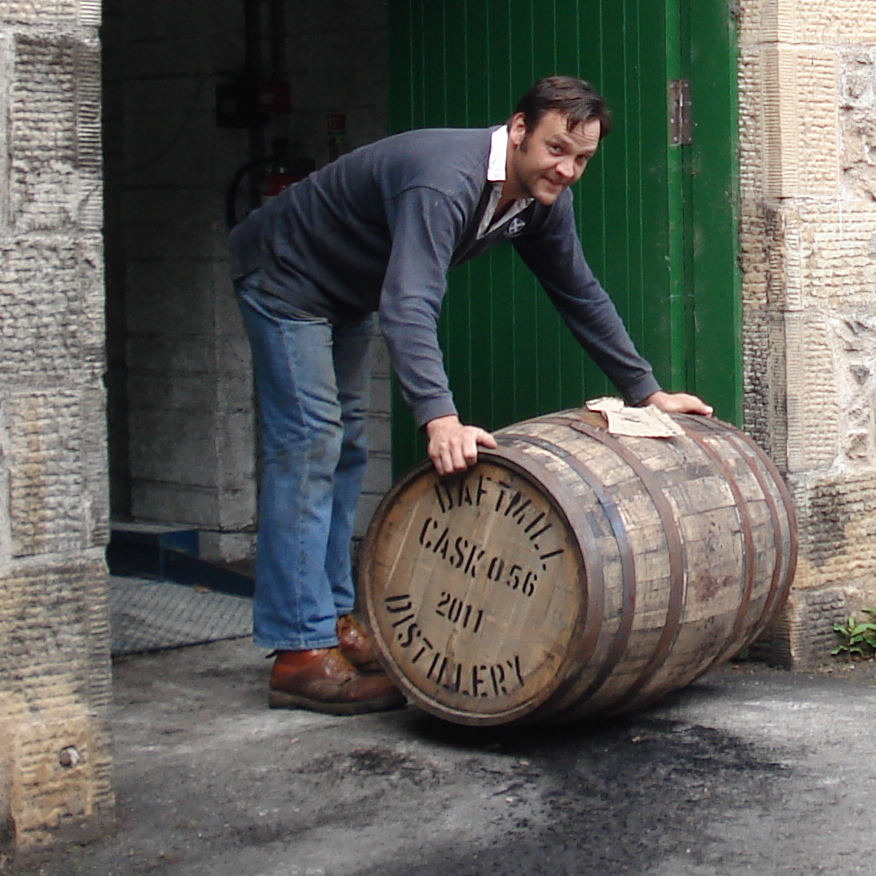An interview with Daftmill’s Francis Cuthbert
Author: Jonny McMillan

Francis Cuthbert, distiller, farmer, and co-founder of Daftmill in Fife, joins Jonny McMillan to talk malt, peat, Covid, selling the kids and when, if ever, he’ll celebrate Daftmill’s success.
JM: It’s been nearly three years since the first Daftmill release; how do you feel about the distillery’s growing cult status?
FC: Cult status? Yes, the cult is coming along nicely. In fact, for the next batch of single casks, I think people will need to shave their heads and get Daftmill tattoos to be eligible for a bottle. If demand still outstrips supply, we can also do a ballot.
JM: I remember feeling quite excited reading a review by whiskyfun.com’s Serge Valentin comparing Daftmill to Rosebank, a distillery which I know was something of an inspiration for you. Are there any reviews, good or bad, that you’ve enjoyed reading?
FC: It is always an honour to be compared with a distillery like Rosebank. As we release more whisky, the reviews tend to compare the current release with a previous one – like “the 2009 sherry cask has better balance than the 2006 cask” rather than with other distilleries.
I enjoy reading other people’s thoughts, but you need to be careful. The person giving a really high score might just be doing it to try and inflate the price of his bottle on the secondary market; the person giving a bad review might be someone who has asked for free samples in return for “co-operation” and been turned down. If it is someone’s honest opinion, whether it is good or bad, you have to respect it. Different people whose opinions you respect can have widely different views on the same whisky.
JM: How have you been affected by the pandemic? Have you had to focus more on the farm, or has it given you more time to distil?
FC: I have been practising for this pandemic for the last 30 years. Working from home – and working on my own – is second nature to me, so I have been much luckier than most.
The farm and the distillery have carried on pretty much as near normal as possible. The fact that there was nowhere to go, no whisky festivals, etcetera, means we have spent more time this year distilling resulting in a lot more casks filled this year.
JM: After the pandemic, we should throw a celebratory dinner in Berry Bros. & Rudd’s cellars and invite a few guests to enjoy some Good Ordinary Claret washed down by a dram or two of Daftmill. Who would be on your guest list?
FC: Well, obviously we will need some A list celebs like Ronnie Cox or Doug McIvor. I would have quite liked to be able to meet the late whisky writer Michael Jackson. But, to be honest, I think good food, good drink and good company with some good laughs are better than celebrity.
JM: You’re known for being very humble in your success, and often playing down the quality of your whisky. When do you think you’ll see Daftmill as a success? Is there an accolade or milestone where you’ll finally give yourself a pat on the back?
FC: We don’t enter any competitions so don’t win any accolades. I think you need to keep trying to improve. When you are ploughing and get from one end of the field to the other, you look back and there will be a little kink or bend somewhere along the furrow. So when you turn and go back you try and straighten it up probably creating another kink somewhere else. Distilling is kind of like that each day you do a mash or distil and do your best and the following day you try to do better.
JM: Would you experiment with using peated barley, or barley that has been malted in non-traditional ways – chocolate malt for example?
FC: Currently, we are only using malt made from barley grown ourselves. We get one batch malted, and that normally does us for a year. If I wanted to try peated malt, I would need to buy in commercial malt – the maltster we use doesn’t do peating on site. And that kind of goes against what we are about. The problem with experiments and small batches is always the logistics.
JM: Are there any other young distilleries you’ve enjoyed sharing information, data, knowledge, stories and drams with?
FC: When we first started there was quite a lot of people who wanted to see what we had done with a view to starting their own distillery. Lately, this hasn’t happened so much – probably because there is now a lot of newer, more exciting distilleries than us. I do remember a visit by a couple of guys from Diageo before the building of Roseisle distillery; I’m not sure if they would have taken away anything useful.
JM: If you had to sell the farm or the distillery, which one would you choose?
FC: Probably the kids first.
JM: What steps have you taken towards sustainable practices, both on the farm and at the distillery?
FC: We haven’t introduced anything to try and be “sustainable” We just don’t waste anything. Almost everything has another use. Farming has always been kind of like this. It used to be called “being tight”.
In the distillery, the spent grains from the mash are fed to the cattle. The leftovers from the distillation are spread back on the fields to fertilise the barley and grass. We don’t have a lot of packaging, fancy tubes or boxes that just end up in the bin anyway.
The latest release from Daftmill is currently available. For your chance to purchase a bottle, enter our ballot before 19th January.



Long may your great work continue Francis! keep being “tight”